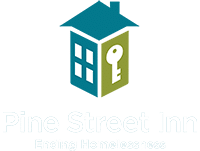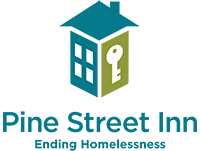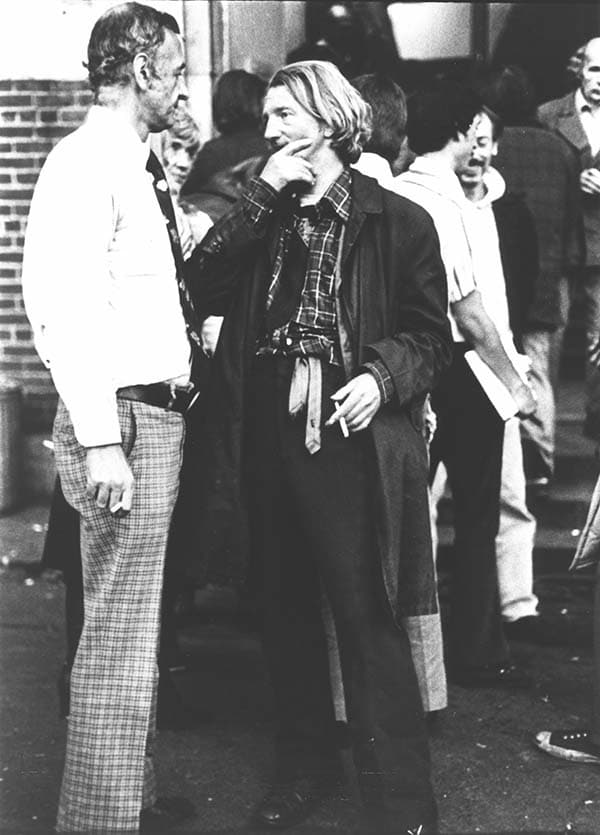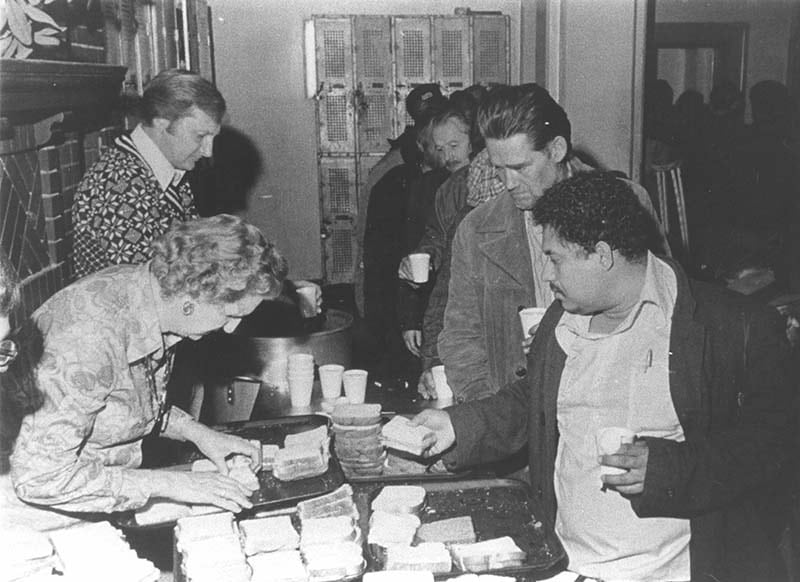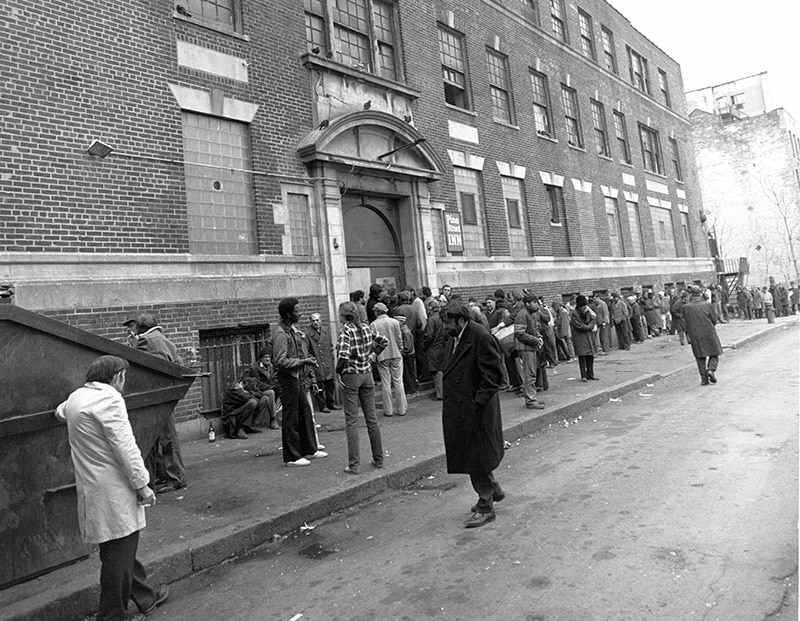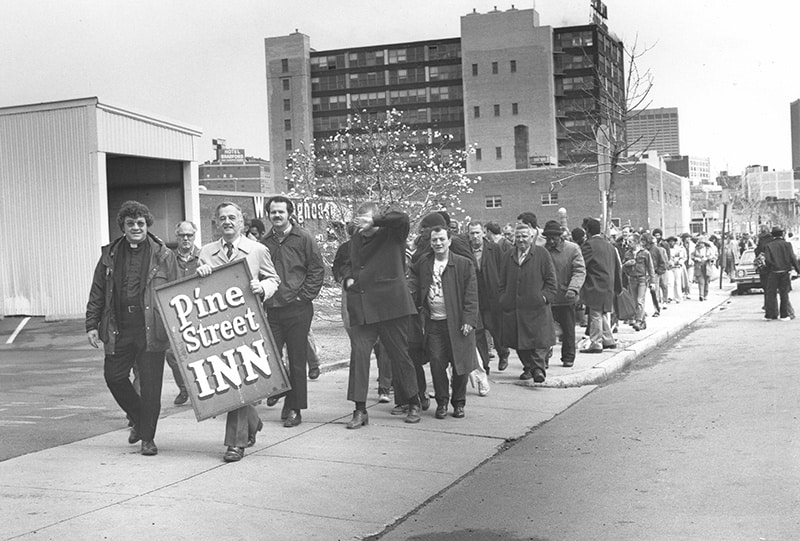Pine Street Inn History
Pine Street Inn began its journey in 1969, offering a safe alternative to the streets of Boston to approximately 200 men suffering from alcoholism.
Since then, our comprehensive programs and services have expanded to include housing, emergency services, and workforce development to support more than 2,100 individuals each day. Our mission is to end homelessness by making a home and community a reality for all.
Founding Years
1969 – Paul Sullivan, one of Pine Street’s founders, became the first director and set our program’s fundamental tone of respect. Anyone seeking shelter is considered a ‘guest’ of Pine Street Inn, located in Chinatown on Pine Street.
1971 – A volunteer food group prepared and brought in meals each night. Today, dedicated volunteers help to prepare and serve 2,000 meals daily.
Response to Increased Needs
The size and composition of Boston’s homeless population radically changed with the deinstitutionalization of mentally ill individuals, leading to an influx of many younger homeless people.
1980 – With its original facility on Pine Street no longer adequate for the growing number of homeless individuals, Pine Street Inn moved into the former Boston Fire Department Headquarters on Harrison Avenue in Boston’s South End and began offering services for women in a separate unit with 50 emergency shelter beds.
Early 1980s – A decline in federal rental subsidies, astronomical rise in housing prices and the beginning of gentrification in many neighborhoods resulted in an affordable housing crisis in Boston. The city experienced a loss of approximately 20,000 lodging rooms, while funding cuts also forced halfway houses for those transitioning out of the prison system to close. Pine Street was inundated.
1984 – Pine Street Inn became one of the first agencies in New England to develop affordable supportive housing with on-site support staff for homeless individuals when 26 homeless individuals moved into a home and community in Brookline.
1986 – When a homeless man froze to death just two blocks from Pine Street Inn, Pine Street started a street outreach program with a van that combed Boston’s streets during the night offering food, blankets and warm clothing to individuals who chose not to come into shelter. Later, a second van was added.
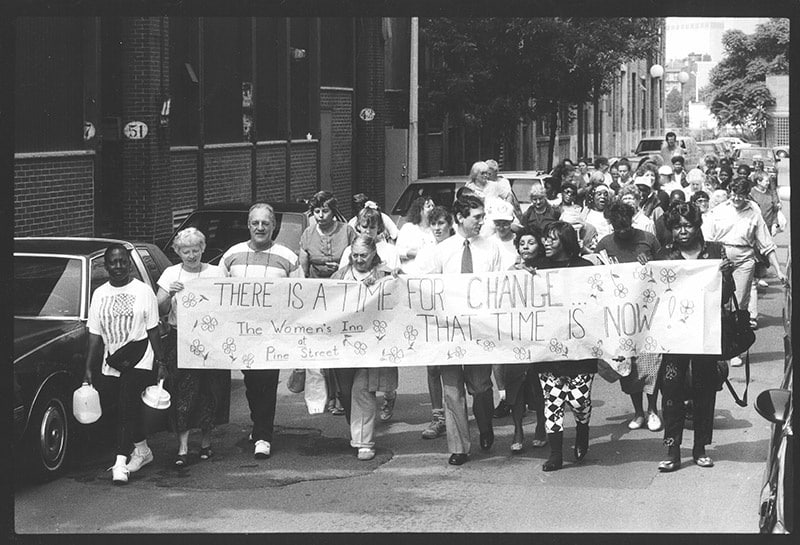
Providing Housing and Programs
1987 – Eight new supportive housing residences opened in Roxbury, Dorchester, Jamaica Plain and the South End.
1990 – A 10-week food services training program was established to teach individuals basic food industry skills and to prepare them for employment.
1992 – Recognizing the need for separate facilities for women, Pine Street purchased and renovated a former sewing machine factory adjacent to its main location to provide shelter and transitional services for 110 people. Today, Yawkey House is the largest nonprofit shelter and resource for homeless women in New England.
1995 – Specialized transitional programs with dedicated case management and counseling staff are designed to help move individuals from emergency shelter to housing with support.
The first residence for mentally ill tenants opened in Dorchester for 10 individuals, with 24-hour on-site staff providing comprehensive care and support services.
1996 – Longtime corporate partner, Ninety Nine Restaurants, supported the creation of new kitchen facilities at Pine Street Inn, expanding the food services training program.
1998-1999 – Three new residences opened in Dorchester.
2002 – Four houses opened: Three in Brookline and one in Jamaica Plain.
Pine Street Inn opened its first supportive housing residence for homeless families in Dorchester.
Expanded Partnerships
2005 – Pine Street Inn expanded partnerships with several community development corporations to address the severe lack of affordable housing in Boston.
A home on Geneva Avenue in Dorchester was Pine Street’s first residence for elders, a population whose incidence of homelessness and need for affordable housing grows dramatically.
2006 – In collaboration with Trinity Church Boston, Pine Street created housing for 22 homeless individuals, bringing the total number of tenants in supportive housing to 400.
Chronic Homelessness Support
In April, Pine Street launched an innovative Housing First program for chronically homeless individuals.
Expanded Housing
Pine Street Inn added several new properties:
– Opened Doe House in Boston’s Mission Hill neighborhood providing housing for 19 people.
– Took over Tuttle House in Dorchester, home to 26 elderly individuals.
– Purchased 38-42 Upton Street in the South End.
Important Milestones
– 40 years of helping homeless individuals rebuild their lives,
– 25 years of supportive housing, and
– 25 years of dedicated service by Lyndia Downie, President and Executive Director.
Housing with Support Expanded
2010 – Pine Street Inn expanded to more than 550 units of housing throughout greater Boston, with a goal to add more housing with support while decreasing the number of those in emergency shelter.
2011 – Pine Street opens two new residences: Sister Virginia Mulhern House in Jamaica Plain and 38-40 Upton Street in the South End. A transitional housing program for U.S. military veterans also opens in Dorchester.
Merge with hopeFound
Pine Street Inn merges with hopeFound, an organization dedicated to ending homelessness in Jamaica Plain. hopeFound operated Shattuck Shelter, which opened in 1983 by Governor Michael Dukakis and offers year-round overnight emergency shelter and support for 120 homeless individuals each night. The merger also added Employment Services and Stabilization to Pine Street Inn’s programs.
Meeting Homelessness Needs
Pine Street Inn tips the balance, offering more beds in supportive housing than in shelter.
Boston’s Way Home Fund Established
Mayor Martin J. Walsh announces the establishment of the Boston’s Way Home Fund to support the City of Boston’s plan to end chronic homelessness. The fund will raise $10 million over the course of four years, which will be used to create 200 new units of supportive, sustainable, long-term housing for chronically homeless individuals.
50th Anniversary
Pine Street Inn marks its 50th anniversary in the community.
With support from our donors and community partners,
we fulfill this mission, vision and values every day as we work to end homelessness in Greater Boston.
